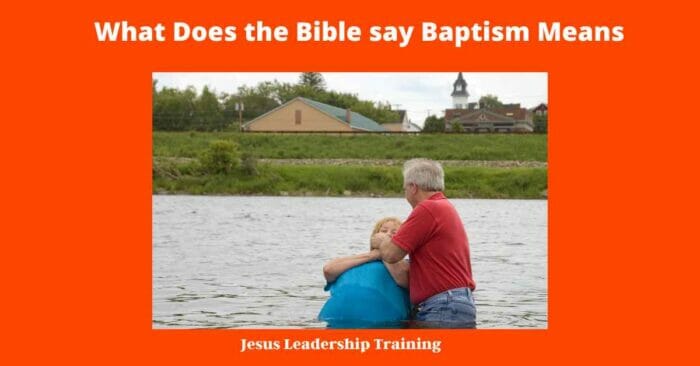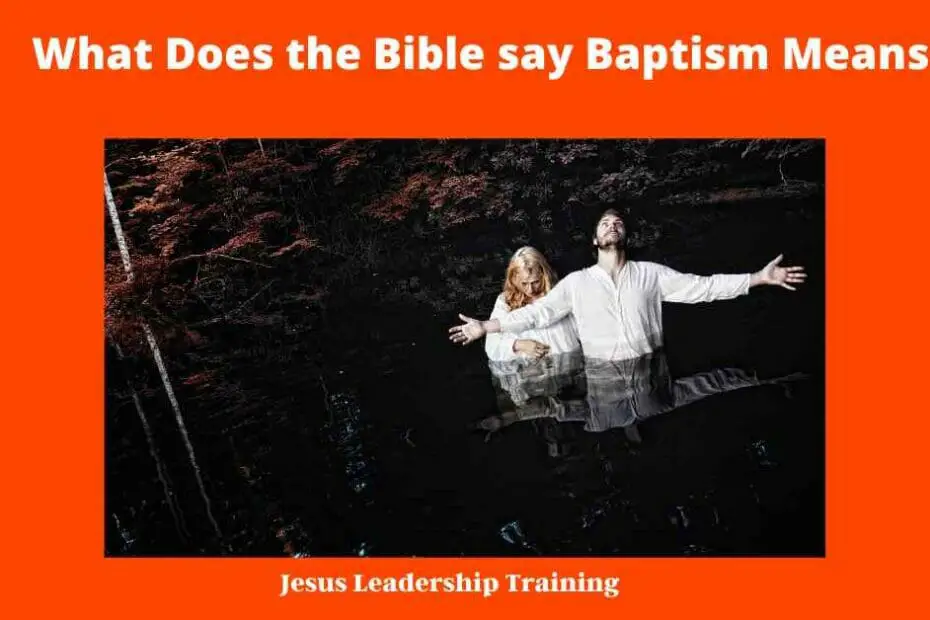What Does the Bible say Baptism Means – The Bible provides many references to baptism, a Christian practice that signifies a person’s commitment to God and is a sign of the believer’s repentance. The word baptism is derived from the Greek word baptisma (βαπτισμα) and baptizo (βαπτιζω), which mean to “dip” or “immerse.”
The Bible’s teaching on baptism is not limited to a single interpretation, but it does provide a clear understanding of the significance of the act. In the Bible, baptism is often associated with rebirth, the washing away of sin, and a public declaration of the believer’s faith in Jesus Christ. It is also a visible representation of the believer’s commitment to serve and obey God. Ultimately, baptism is a spiritual sign of the believer’s dedication to live a life devoted to the Lord.
Table of Contents
What Does the Bible say Baptism Means
The Bible is a vast collection of books that contain a wealth of information about God and His plans for humankind. It is an invaluable source of spiritual guidance, wisdom, and insight. One of the topics that is frequently discussed in the Bible is baptism. Baptism is a ritual act of initiation into the Christian faith that is widely practiced today, but what does the Bible say about it?
In this article, we will explore the various aspects of baptism that are discussed in the Bible. We will look at what Jesus says about it, the meaning behind it, its significance of it, its process of it, its spiritual dimensions of it, and the role of the Holy Spirit in it. We will also discuss the practice of infant baptism, Christ’s baptism, and what the Bible says about baptism and faith.
Finally, we will look at the baptismal practices of the New Testament, the function of baptism, baptism for the dead, and what it means to be baptized with the Holy Spirit and with fire.
By the end of this article, you will have a better understanding of what the Bible says about baptism and how it can impact your life.

What Does Jesus Say about Baptism?
The most important thing that the Bible says about baptism is that Jesus himself was baptized. In Matthew 3:13-17, Jesus went to John the Baptist to be baptized. John was reluctant at first because Jesus was sinless and did not need baptism for repentance. However, Jesus said that it was necessary to fulfill all righteousness and then submitted to baptism.
This event shows that baptism is an important part of the Christian faith. It is a sign of commitment to God and a way to publicly declare one’s faith. Jesus also said in Matthew 28:19 that we should go and make disciples of all nations, baptizing them in the name of the Father, the Son, and the Holy Spirit. This reinforces the idea that baptism is an important part of Christian faith and practice.
List of What Religious Faiths Practice Baptism
- Christianity
- Lutheranism
- Anglicanism
- Catholicism
- Baptist
- Methodist
- Presbyterian
- Pentecostal
- Mormonism
- Seventh-day Adventism
- Jehovah’s Witnesses
- Eastern Orthodoxy
- Oriental Orthodoxy
- Quakers
- Unitarians
- Anglican Catholics
- The Church of Jesus Christ of Latter-day Saints
- Christian Science
Exploring the Meaning Behind Baptism According to the Bible
The Bible teaches that baptism is a way to symbolically enter into a covenant relationship with God. It is a sign of the believer’s commitment to follow Jesus and live for Him. Romans 6:4, it says, “We were therefore buried with Him through baptism into death in order that, just as Christ was raised from the dead through the glory of the Father, we too may live a new life.” This passage shows that baptism is a way to die to our old sinful ways and be born again into a new life in Christ.
Baptism is also a way to publicly proclaim your faith in Jesus Christ. In Acts 2:38, it says, “Peter replied, ‘Repent and be baptized, every one of you, in the name of Jesus Christ for the forgiveness of your sins. And you will receive the gift of the Holy Spirit.’” This shows that baptism is a way to publicly declare one’s faith in Jesus and receive the gift of the Holy Spirit.
What is the Significance of Baptism in the Bible?
The Bible teaches that a baptism is an important act of faith and obedience. Colossians 2:12, it says, “having been buried with Him in baptism, in which you were also raised with Him through your faith in the working of God, who raised Him from the dead.” This passage shows that baptism is a way to demonstrate our faith in the resurrection of Jesus.
Baptism is also a way to show our union with the body of Christ. In 1 Corinthians 12:13, it says, “For we were all baptized by one Spirit so as to form one body—whether Jews or Gentiles, slave or free—and we were all given the one Spirit to drink.” This shows that baptism is a way to demonstrate our unity with other believers and our fellowship with the Holy Spirit.
How Does the Bible Describe the Process of Baptism?
The Bible describes the process of baptism as a ceremonial act of washing. In Acts 22:16, it says, “And now what are you waiting for? Get up, be baptized, and wash your sins away, calling on His name.” This clearly shows that a baptism is a physical act of washing away sins.
The Bible speaks of baptism by immersion. In Matthew 3:16, it says, “As soon as Jesus was baptized, He went up out of the water.” This shows that Jesus was baptized by immersion, which is a common practice in Christianity today.

Exploring the Spiritual Dimensions of Baptism According to the Bible
The Bible teaches that baptism is more than just a physical act. It is also a spiritual act of cleansing and renewal. In Titus 3:5, it says, “He saved us, not because of righteous things we had done, but because of His mercy. He saved us through the washing of rebirth and renewal by the Holy Spirit.” This shows that baptism is a way to be spiritually cleansed and renewed by the Holy Spirit.
The Bible also speaks of baptism as an act of identification with Jesus. In Romans 6:3-4, it says, “Or don’t you know that all of us who were baptized into Christ Jesus were baptized into His death? We were therefore buried with Him through baptism into death in order that, just as Christ was raised from the dead through the glory of the Father, we too may live a new life.” This passage shows that through baptism, we identify with Jesus’ death and resurrection and are raised to new life in Him.
What Does the Bible Say About Infant Baptism?
The Bible does not explicitly say anything about infant baptism, but the practice is based on the belief that, as children of believers, infants are members of God’s covenant family and should be baptized as such. This is supported by passages such as Acts 2:39 which says, “The promise is for you and your children.” This suggests that children are included in the covenant promises of God and should be baptized. Faiths that practice this believe that all men have inherited Adam’s sin. Baptism washes this sin, but what about between the age of Birth and adulthood? Infant Baptism is usually performed by a Priest. When the Child matures then the right of confirmation allows them to accept their early Baptism.
What is the Significance of Christ’s Baptism in the Bible?
The Bible teaches that the baptism of Jesus had great significance. Matthew 3:13-17, it says, “Then Jesus came from Galilee to the Jordan to be baptized by John. But John tried to deter him, saying, ‘I need to be baptized by you, and do you come to me?’ Jesus replied, ‘Let it be so now; it is proper for us to do this to fulfill all righteousness.’ Then John consented. As soon as Jesus was baptized, He went up out of the water. At that moment heaven was opened, and He saw the Spirit of God descending like a dove and alighting on Him.”
This passage shows that Jesus’ baptism was significant because it was an act of obedience and humility, it was a sign of God’s approval, and it opened the heavens so that the Holy Spirit could come upon Him. It is also a sign of Jesus’ commitment to fulfill all righteousness and to be the perfect sacrifice for our sins.
How Does the Bible Describe the Role of the Holy Spirit in Baptism?
The Bible teaches that the Holy Spirit plays an important role in baptism. In Acts 2:38, it says, “Peter replied, ‘Repent and be baptized, every one of you, in the name of Jesus Christ for the forgiveness of your sins. And you will receive the gift of the Holy Spirit.’” This shows that when we are baptized, we are also baptized with the Holy Spirit.

The Bible also teaches that the Holy Spirit is the one who gives us new life in Christ. In Titus 3:5, it says, “He saved us, not because of righteous things we had done, but because of His mercy. He saved us through the washing of rebirth and renewal by the Holy Spirit.” This shows that the Holy Spirit is the one who gives us new life when we are baptized and helps us to be transformed into new creations in Christ.
What Does the Bible Say About Baptism and Faith?
The Bible teaches that baptism is not just a physical act; it is also an act of faith. Mark 16:16, says, “Whoever believes and is baptized will be saved.” This shows that faith is an essential part of baptism and that it is through faith that we are saved.
The Bible also teaches that baptism is a way to publicly declare our faith in Jesus Christ. In Acts 8:36-38, it says, “As they traveled along the road, they came to some water and the eunuch said, ‘Look, here is water. Why shouldn’t I be baptized?’ And he gave orders to stop the chariot. Then both Philip and the eunuch went down into the water and Philip baptized him.” This shows that baptism is a way to publicly declare our belief in Jesus and demonstrate our faith.
What were the Baptismal Practices in the New Testament?
In the New Testament, baptism was typically done by immersion. Matthew 3:16, it says, “As soon as Jesus was baptized, He went up out of the water.” This shows that Jesus was baptized by immersion, which is the most common practice today.
In the New Testament, baptism was also done in the name of the Father, the Son, and the Holy Spirit. In Matthew 28:19, it says, “Therefore go and make disciples of all nations, baptizing them in the name of the Father and of the Son and of the Holy Spirit.” This shows that baptism is an important part of Christian faith and practice and should be done in the name of the Trinity.
What was the Function of Baptism
In the New Testament, baptism was used to publicly declare one’s faith in Jesus Christ. In Acts 2:38, it says, “Peter replied, ‘Repent and be baptized, every one of you, in the name of Jesus Christ for the forgiveness of your sins. And you will receive the gift of the Holy Spirit.’” This shows that baptism is a way to publicly declare one’s faith in Jesus and receive the gift of the Holy Spirit.
Baptism was also used as a sign of the believer’s commitment to live for Jesus. In Romans 6:3-4, it says, “Or don’t you know that all of us who were baptized into Christ Jesus were baptized into His death? We were therefore buried with Him through baptism into death in order that, just as Christ was raised from the dead through the glory of the Father, we too may live a new life.” This shows that baptism is a way to demonstrate our commitment to live for Jesus and be raised up in Him.
What was Baptism for the Dead
The Bible does not explicitly discuss the practice of baptism for the dead, but some have interpreted 1 Corinthians 15:29 as a reference to it. In this passage, it says, “Now if there is no resurrection, what will those do who are baptized for the dead? If the dead are not raised at all, why are people baptized for them?”
This passage has been interpreted in different ways. Some believe that it is referring to a practice of vicarious baptism, in which a living person is baptized on behalf of a deceased loved one. Others believe that it is referring to a practice of posthumous baptism, in which a person who has died is baptized in the afterlife.
What is being Baptized with the Holy Spirit
The Bible teaches that when we are baptized with the Holy Spirit, we receive the power to live a life of obedience to God. In Acts 1:5, it says, “For John baptized with water, but in a few days you will be baptized with the Holy Spirit.” This shows that when we are baptized with the Holy Spirit, we receive the power to live a life of obedience to God.
The Bible also teaches that the Holy Spirit gives us a new life in Christ. In Titus 3:5, it says, “He saved us, not because of righteous things we had done, but because of His mercy. He saved us through the washing of rebirth and renewal by the Holy Spirit.” This shows that when we are baptized with the Holy Spirit, we receive a new life of grace and renewal in Christ.
What was being Baptized with Fire
The Bible teaches that when we are baptized with fire, we are purified and refined by God. In Matthew 3:11, it says, “I baptize you with water for repentance. But after me comes one who is more powerful than I, whose sandals I am not worthy to carry. He will baptize you with the Holy Spirit and fire.” This shows that when we are baptized with fire, we are purified and refined by God so that we can be more effective witnesses for Him.
Final Thoughts – What Does the Bible Say about Baptism Mean
Baptism is a significant part of Christian life and is one of the most important biblical practices that followers of Jesus Christ practice. The Bible speaks of baptism in various ways, making it clear what it means and why it is important. In order to understand what the Bible says about baptism, it is important to look at the scriptures, the practices of early Christians, and the theological implications of baptism.
The Bible mentions baptism multiple times, but the most important references are found in the book of Matthew and in the book of Acts. In Matthew 3:13-17, we see Jesus being baptized by John the Baptist. This event is significant because it was the beginning of Jesus’s public ministry. In the book of Acts, we see the significance of baptism as it is associated with the coming of the Holy Spirit. In Acts 2:38-41, we see that those who were baptized with John the Baptist’s baptism were also baptized in the name of Jesus Christ and received the Holy Spirit.
From these scriptures, we can see that baptism is a practice that symbolizes putting your faith in Jesus Christ and a declaration of your commitment to follow Him. Baptism is also a means that God uses to convey grace, which is the undeserved favor of God. This is why many churches require adult baptism in order to be a member. Baptism is also a way to show submission and obedience to God, as those who are baptized are declared to be followers of Jesus.
In addition to the scriptures, the practice of baptism provides further insight into what the Bible says about baptism. The earliest Christian baptisms were done in the name of Jesus Christ, according to Matthew 28:19-20. This practice was continued throughout the early Church, as all those who repented of their sins and put their faith in Jesus were baptized.
The practice of believer’s baptism was also important in the early Church. Believers’ baptism is the practice of baptizing those who have already made a commitment to follow Jesus. This practice was important because it was a way to show that those who had already put their faith in Jesus were publicly declaring their commitment to Him.
The practice of infant baptism is also a part of the Christian tradition. This practice is based on the belief that baptism is a sign of God’s grace and that it is available to all, even those who are too young to make a conscious decision to follow Jesus. Infant baptism is a way to symbolically welcome a child into the Church and to declare that God’s grace is upon them. Those that understand it this way usually then have a Rite of Confirmation. That is when the Young person is old enough to understand the Commitment of Baptism.. He or She can accept it. Some call this the age of accountability.
In conclusion, the Bible speaks about baptism in several ways, including through scripture, early Church practices, and theological implications. Baptism is a declaration of faith in Jesus Christ, a way to show obedience to God, and a means of conveying God’s grace. Baptism is a significant part of the Christian life, and it is important to understand what the Bible says in order to fully appreciate this important practice.



